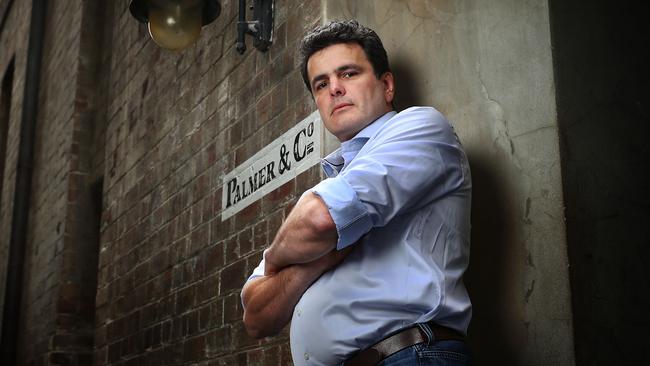‘Solvent’ neobank Xinja keen to reinvent itself
Failed neobank Xinja’s reincarnation as a wealth platform for 25-45 year-olds will be considered at an extraordinary general meeting on Wednesday.

Failed neobank Xinja’s reincarnation as a wealth platform for 25-45 year-olds will be considered at an extraordinary general meeting on Wednesday, despite last-minute talk of a recapitalisation proposal from aggrieved institutional investor Mackellar Capital.
A Xinja spokesman said on Sunday the company was willing to fully explore all recapitalisation deals but no such proposal had been received from Mackellar, which holds about 1 per cent of Xinja.
Further, it was “not an option at this point in time” for Xinja to retain its banking licence after returning its deposits to customers and handing back its licence to the Australian Prudential Regulation Authority.
“Following the return of all deposits, Xinja is financially solvent and in a position to pursue a number of existing business opportunities,” the spokesman said.
“We have received positive feedback from shareholders regarding this plan but will of course continue to listen to the views of all shareholders.”
The reincarnation proposal, put forward in a letter penned by chief executive Eric Wilson, initially focuses on Xinja’s US share-trading platform Dabble, although shareholders are also invited to consider a wind-up.
The letter asks if investors would prefer to lock in a substantial loss of 95c-100c in the dollar, or recapitalise and seek a superior return with the prospect of receiving nothing if the new venture fails.
“I don’t wish to sugar-coat this. It will be a long and difficult journey with considerable risk. We will be starting with a small team and limited capital. It will require raising further capital,” Mr Wilson, who declined to comment, writes in the letter.
“These decisions of course rest with the board, but the directors want to seriously consider the wishes of shareholders and this is a strong way to understand that.”
The end of Xinja’s neobanking dream has been a crushing experience for the company, which was part of a 2019 crop of new-age banks brandishing funky apps and sky-high customer approval ratings in the latest existential threat to the major banks.
Branchless and built for the ubiquitous smartphone, they were dubbed neobanks.
Canberra cheered them on, as did the Australian Prudential Regulation Authority, which granted banking licences to Volt in January, 86 400 in July, and Xinja in September.
Judo, a fellow 2019 graduate from the APRA licensing division, was also conferred neobank status, even though it was more of a hybrid model — a technology-enabled, SME challenger bank.
The start-up actually used a relationship banking model, which served the Medici family quite well in the 15th century.

Despite the initial fanfare, the class of 2019 has already been whittled down from four to two, with 86 400 — named after the number of seconds in the day — bought last month by NAB, pending the approval of the competition watchdog.
The recent activity begs the question of whether the biggest existential threat posed by the neobanks was to themselves, and not the incumbents they were targeting.
Judo co-founder Joseph Healy, who once ran NAB’s business bank, says there are three “must-haves” for a new bank to succeed — continuing access to capital; a robust, economically viable and differentiated business model, and strong management with relevant experience.
“You must be able to raise significant amounts of capital over the first five years, so don’t start unless you’re confident of being able to do that,” Healy says.
“But a weakness in any one of the three will result in failure.”
Judo told its investors from the outset that it would need $1bn over four years to build a sustainable business in the SME market, an under-serviced segment which was profitable and growing strongly.
After raising $230m in May last year and a further $284m in December, the bank is investigating an initial public offering before the end of the year.
The valuation for the round four raising in December was $1.65bn, with Healy banking on a “significant” uplift for any IPO.
Xinja and 86 400, on the other hand, had designs on the consumer market, in particular the “highly commoditised” mortgage segment, according to Healy.
“It’s a very big ask, especially when the majors are offering rates at less than 2 per cent,” he says.
“Xinja also failed ‘Banking 101’ by launching a high-priced deposit product (Stash) without any revenue from lending.”
By June last year, the neobank had attracted $457m in deposits and raised $89.2m in capital from investors. The equity base, however, had shrunk to $25m after accumulated losses of $64.2m.
Xinja desperately needed more capital but the final blow came when a $433m investment from Dubai-based World Investments, flagged by Xinja in March 2020, failed to materialise.
With 86 400, NAB took a good look at the business in a round two capital raising late last year, taking an 18 per cent stake before buying the rest for $220m.
The aim is to accelerate the growth of NAB’s digital Ubank.
As of last month, 86 400 had more than 85,000 customers, $375m in deposits, and $270m in approved residential mortgages.
Chief executive Robert Bell says an exit to NAB “isn’t necessarily the path we thought we’d be going down at this stage”.

“We always knew there would either be an IPO or a trade sale at some point and this is perhaps a little earlier than we expected, but on balance we think it’s a really good outcome for our shareholders, our customers and our team,” Bell says.
Until the NAB transaction, 86 400 had raised $130m from investors, with the deal struck at a strong premium to the last round.
Bell remains confident that the company could have continued to meet its capital needs.
“I don’t actually subscribe to the view that the capital-raising environment has changed,” he says.
“Of the things we’ve learnt along the way, the most important – as with anything – is execution.
“If you look at the strategies of the neobanks around the world, they actually sound quite similar, but the proof is in the execution.”
Volt, for its part, has gone live with a small group of people to make sure any teething problems are fixed before adding customers from its waitlist.
Founder and CEO Steve Weston says his company’s point of differentiation is its “banking as a service” platform, similar to the Westpac venture with 10X Future Technologies announced in late 2019.
The platform enables third parties to distribute banking products to their customers.
“The majority of our customers will not come from traditional channels like social media but from our corporate partners, which will earn less interest on cash management accounts,” Weston says.
“People think that neobanks are all about the high interest-rate deposit, but our average balance is $10,000 and half of our retail deposits come from customers over the age of 50, which is what we expected, and that’s just on the retail side.
“The cost of acquiring customers is sustainably lower, and I think the model will get traction like it has in other parts of the world.”
Neobanks around the world have done “spectacularly well” gaining customers, Weston says.
The real test, though, is the pathway to profitability.







To join the conversation, please log in. Don't have an account? Register
Join the conversation, you are commenting as Logout